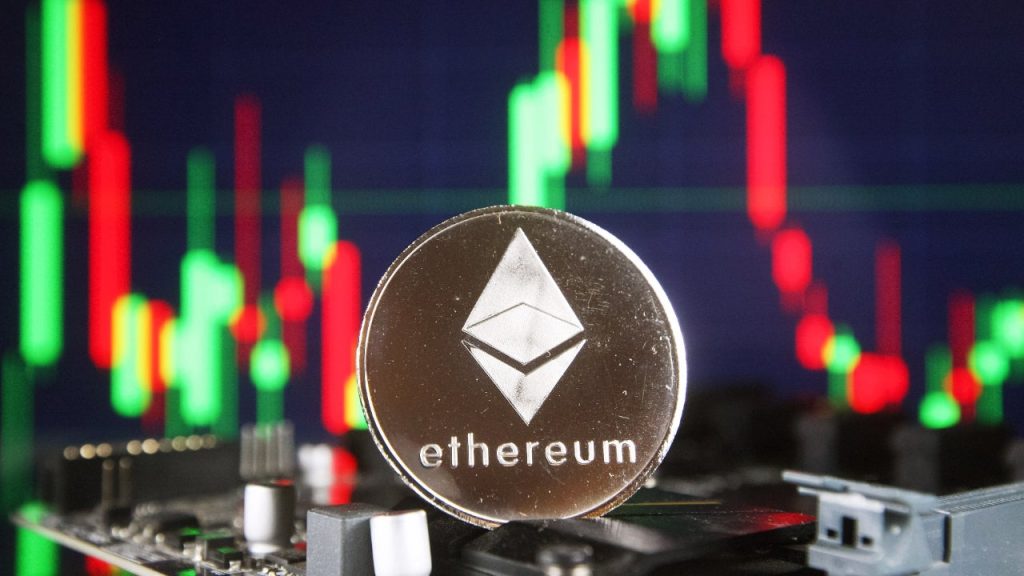Key takeaways
- Ethereum is a cryptocurrency and decentralized platform that can be the basis for smart contracts and other apps.
- Ethereum runs on a proof-of-stake system, making it more energy efficient than Bitcoin’s proof-of-work system.
- Investing in Ethereum is speculative and driven by market sentiment.
Ethereum is among the most popular cryptocurrencies in the world, and ranks second in total size (as of August 2025), behind Bitcoin, a coin that’s become synonymous with crypto.
As the brainchild of eight co-founders, Ethereum made its debut in 2015. The cryptocurrency or platform is called Ethereum, while the individual unit is called an ether (2 ether, 17 ether, etc.)
Ethereum operates on a decentralized computer network, or distributed ledger called a blockchain, which manages and tracks the currency. It can be useful to think of a blockchain like a running receipt of every transaction that’s ever taken place in the cryptocurrency. Computers in the network verify the transactions and ensure the integrity of the data.
This decentralized network is part of the appeal of Ethereum and other cryptocurrencies. Users can exchange money without the need for a central intermediary such as a bank, and the lack of a central bank means the currency is nearly autonomous. Ethereum also allows users to make transactions nearly anonymously, even if the transaction is publicly available on the blockchain.
How Ethereum is used
While the whole field of crypto is referred to in terms of currency, it may be more useful to think of crypto (even the Ether coin) as a token that can be spent for a specific purpose enabled by the Ethereum platform. For example, sending money or buying and selling goods are functions enabled by the coin.
But Ethereum can do more than operate as a token, including:
- Smart contracts: Ethereum powers smart contracts — a type of self-executing code that automatically carries out agreements when certain conditions are met. There are no intermediaries, no trust to build, just the computer running code. Smart contracts play a central role in dApps built on Ethereum.
- Decentralized apps, or dApps: Ethereum lets developers build and run dApps directly on its blockchain. These dApps allow users to play games, invest, send money, track an investment portfolio, follow social media and more.
- Non-fungible tokens: These tokens can be powered by Ethereum and can allow artists or others to sell art or other items directly to buyers using smart contracts.
- Decentralized finance: Some people believe that by using Ethereum and smart contracts, users are able to avoid centralized (government) control over the movement of money or other assets.
Again, it might be more accurate to think of Ethereum as a token that powers various apps rather than as merely a cryptocurrency that allows users to send money to each other.
How ether coins are created
New ether coins are created when owners validate transactions in the currency. Ether coins are created using what’s known as a “proof-of-stake” process. In this process, the cryptocurrency relies on the owners of the coin, stakeholders, to validate transactions in the cryptocurrency. In return, validators earn rewards in the form of ether coins. But validators could also lose coins if they approve fraudulent transactions or try to cheat the system.
Validators must have a significant stake in the crypto to participate. But even smaller investors can join in the staking system and earn rewards by pledging their coins with a validator.
Up until September 2022, Ethereum used a “proof-of-work” process, like the one used by Bitcoin, to issue new coins and manage its system. In this process, the decentralized crypto network performs complex mathematical and probability calculations to “mine” crypto coins.
A proof-of-stake process is much more energy-efficient than a proof-of-work process. One of the key criticisms leveled at Bitcoin is how much energy it expends to manage its system. A proof-of-stake process can also allow for faster and greater transactions.
The total annual issuance of ether is limited. As of August 2025, there were about 120.7 million ether in existence. That contrasts sharply to Bitcoin, where a maximum of 21 million coins can be created and new issuance becomes harder each year. And it contrasts still further with Dogecoin, where issuance is completely unlimited. Experts estimate that the annual issuance of ether has dropped approximately 87 percent since its adoption of a proof-of-stake system.
Is Ethereum a good investment?
Ethereum has risen significantly over the last few years, so those who bought-and-held years ago have done well. But rather than look at yesterday’s price moves and be fearful of missing out, it’s important to understand what you’re investing in. And on this basis, those who buy Ethereum are buying a cryptocurrency that is not backed by any hard assets or cash flow.
That may sound trivial, but it’s the key difference between stocks and cryptocurrency. A stock is a fractional ownership in a business, so its performance over time is due to the ongoing success of that business. If the business grows its profit, its stock is likely to follow that growth over time. Stockholders have a legal ownership stake in the assets and cash flow of that business.
In contrast, Ethereum — and most other popular cryptocurrencies — are backed by nothing at all. The only thing holding up the price is the optimism of other investors, all of whom think they’ll be able to sell the cryptocoin for more money later to someone else — what’s called the “greater fool theory” of investing. Speculation is the only thing driving Ethereum and other cryptos higher.
For this reason, among others, investing legend Warren Buffett won’t touch cryptocurrency and has even gone on record to call it “rat poison squared.”
Ethereum ETFs: Investing without ownership
Traded since July 2024, Ethereum spot exchange-traded funds (ETFs) track the price of Ethereum. Investors can buy and sell shares of the ETF on a stock exchange, gaining exposure to Ethereum’s price movement without needing to directly purchase and hold the cryptocurrency itself.
Ethereum ETFs have seen massive inflows lately, with iShares Ethereum Trust (ETHA) reaching $10 billion faster than any ETF since Bitcoin, according to Bloomberg ETF analyst Eric Balchunas.
Should you buy or stake Ethereum?
If you’re looking to speculate on Ethereum, it’s simple to just buy and trade the cryptocurrency on a popular trading platform such as Robinhood or Binance.US. You can access the market 24 hours a day, and you’ll have good liquidity, meaning you can transact without moving the price much. The profit calculus is simple, too: You profit when you sell coins for more than you paid.
If you’re thinking about staking Ethereum, you have a few options. More advanced users can participate in solo staking, which requires running your own validator. You’ll need technical expertise, a significant position (typically a minimum of 32 ether) and dedicated hardware.
A more accessible option is participating in a staking pool. You contribute your ether to a pool along with other investors, and the rewards are distributed proportionally based on your contribution. Some crypto exchanges also offer staking services, which are convenient, but might generate lower returns.
In the end, it’s easier to buy Ethereum than to stake it and requires less effort.
Bottom line
Speculators can invest in cryptocurrencies such as Ethereum directly, but they can also invest in the companies that may profit from a move toward digital currencies.
Whether you’re trading Ethereum, Bitcoin or any cryptocurrency companies, it’s vital to understand the risks, including the potential loss of your entire investment. Investors should take a measured approach with cryptocurrency, given its volatility and many risks. Those who are looking to get a taste of the action should not invest more than they can afford to lose.
— Bankrate’s Logan Jacoby contributed to an update.
Editorial Disclaimer: All investors are advised to conduct their own independent research into investment strategies before making an investment decision. In addition, investors are advised that past investment product performance is no guarantee of future price appreciation.
Why we ask for feedback
Your feedback helps us improve our content and services. It takes less than a minute to
complete.
Your responses are anonymous and will only be used for improving our website.
Help us improve our content
Read the full article here









